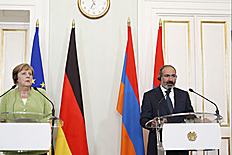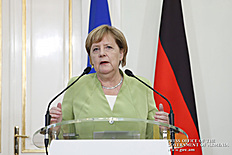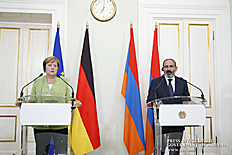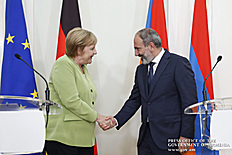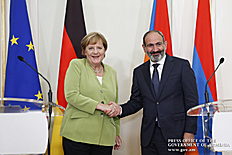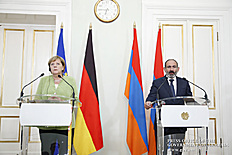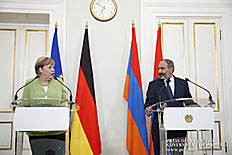Press releases
Armenian Prime Minister, German Chancellor summarize their talks and answer journalists’ questions
more 4 photos
Armenian Prime Minister Nikol Pashinyan and German Chancellor Angela Merkel, who is paying an official visit to Armenia, met with mass media representatives after top-level negotiations and summed up the results of their talks.
RA Prime Minister Nikol Pashinyan: “Dear Mrs. Chancellor, Mrs. Angela Merkel, Esteemed mass media representatives,
Ladies and Gentlemen,
As you may know, this is the first-ever visit paid by a German Chancellor to the Republic of Armenia. Angela Merkel’s visit can be called historical in this respect, and this fact comes as a highlight against the background in which it occurs. I mean the political transformations underway in Armenia and the ongoing democratic changes in our country.
I am happy that we have had quite meaningful discussions with Mrs. Chancellor concerning the Armenian-German, EU-Armenia relations, international and regional issues.
I am glad to note that we had shared views on many agenda items, which once again demonstrates that our countries boast great cooperation potential.
You know that Germany is Armenia’s third largest trade and economic partner on the global scale and the first one in Europe. We hope that our interaction will have not only significant quantitative but also qualitative changes.
We discussed and came to agreement on the following: we will have a joint agenda for specific action addressing different areas and will do specific work in terms of discussing and implementing the proposed agenda.
I am happy that Mrs. Chancellor has already felt the positive atmosphere in Armenia for the Federal Republic of Germany and herself. That atmosphere will be more noticeable during the rest of her visit as the Armenians have deep respect for Germany, the German people and Angela Merkel.”
Federal Chancellor Angela Merkel: “Honorable Mr. Prime Minister Mr. Nikol Pashinyan,
I am glad to visit your country for the first time as a Federal Chancellor. Thank you for the warm and friendly welcome shown to me.
My visit comes at rather a special point of time, not only because later this year you will be celebrating the Centenary of the First Republic of Armenia, but also because a lot of changes are taking place in your country.
I started my visit to Armenia from Tsitsernakaberd Memorial; as a friend and partner of Armenia, we, the Germans, realize what terrible events took place in 1915 against the Armenian people. This fact should not fade into oblivion, and it will never be forgotten: Germany will entertain and foster its remembrance.
We are hosted in Yerevan within the framework of your capital’s 2800th anniversary as evidenced by Armenia’s high cultural and historical traditions and its commitment to building a new future.
We closely followed the recent developments in your country – the peaceful demonstrations, and the velvet revolution as it is being called now. We also talked about what our relationship should be like in the future.
We have dynamically developing relations not only in the bilateral format, but also within the European Union, and I think that we have discussed an effective agenda today concerning both the cultural and economic spheres.
My delegation has an economic constituent that will get in touch with the local partners. We can also collaborate in the fields of infrastructure, digitization, resource management and services.
Cooperation in the field of education is very important. There are numerous schools in Armenia which provide advanced teaching of German language; this program should be expanded. We also have good examples of scientific interaction, and we can further deepen these ties with German scientific institutions.
We also discussed the issue of asylum seekers in Germany. We have been successful cooperating in this area, but we can do more so that Armenian citizens could get medical assistance in Germany.
I am glad that Armenia has signed a Comprehensive and Enhanced Partnership Agreement with the European Union. It is a joyful fact that on the one hand, Armenia is a member of the Eurasian Economic Union and, on the other hand, wants to deepen cooperation with the European Union. Germany will do its utmost to use the opportunities available in that instrument so that Armenia could deepen its cooperation with all EU-member States.
We are ready to assume responsibility for the settlement of the Nagorno Karabakh conflict. You may know that Germany is a member of the OSCE Minsk Group. We have talked about the possibility of resolving the standoff, but it must be resolved in such an atmosphere where all parties are prepared to do so. Germany is ready to assume political responsibility here.
Thank you again for the warm reception. Today, we also visited TUMO Center of Creative Technologies, a wonderful example of schooling philosophy that has been adopted by Armenia, enabling teenagers to demonstrate their skills in the field of innovative technologies.
We, of course, discussed internal political issues, including the fight against corruption. I wish you all the best and every success in your hard and responsible political endeavors.”
Then the Prime Minister of Armenia and the German Chancellor answered two questions on each side.
Public Television of Armenia - The signing of the Enhanced and Comprehensive Agreement between Armenia and the European Union offers new opportunities, but the issue of visa liberalization is still pending. You have mentioned that Germany will support Armenia in this process. I would like to see which way.
Federal Chancellor Angela Merkel – Visa liberalization is effective with Georgia and Ukraine, with whom we have already signed association agreements. It is closely linked to cooperation in migration issues. This cooperation is important for Armenia to make progress in this issue and take some steps.
RA Prime Minister Nikol Pashinyan - During the discussion, we stated that after the recent political changes in Armenia, the statistics show that more people are coming to Armenia than leaving the country, which means that as a matter of fact, the political changes in Armenia should stop the tide of emigration and increasingly lead to repatriation. It goes without saying that the success of internal political processes may catalyze this process.
Deutschlandfunk - Mrs. Chancellor, today you have been to the Genocide Memorial to commemorate the Genocide victims. What did you feel as you were bowing flowers? Also, I would like to ask Mr. Pashinyan: what makes you so much optimistic about Armenia’s ability to find an effective balance between its relations with the EU and Russia?
Federal Chancellor Angela Merkel – I went to Tsitsernakaberd Memorial to pay tribute in the spirit enshrined in the German Bundestag’s resolution of June, 2016. I feel that thereby an important step has been taken to develop the culture of commemoration. We can witness a political settlement, but that is not at all a legal issue for me. That very mindset drove me to pay tribute at Tsitsernakaberd Memorial.
RA Prime Minister Nikol Pashinyan - Your question implied a nuance, as far as I can see. You meant the balance of policy with Russia. I want to state the following: the Republic of Armenia does not build its foreign policy with a partner at the expense of other partners.
We have declared that there will be no turning point in Armenia’s foreign policy after the velvet revolution; no U-turns will occur.
We intend and we are going to implement this intention by developing our relations with Russia in the framework of the Eurasian Economic Union and the CSTO, we are developing relations with the EU countries, including Germany. During the discussion, we stated that this foreign policy approach is fully perceived by the Federal Republic of Germany, and we see neither a contradiction nor a counterbalance here. This was the spirit of our discussion, and I think that the Federal Chancellor will confirm this position.
Armenia TV - Mrs. Chancellor, as far as we know, cooperation-related technical contacts have been held between the Eurasian Economic Union and the European Union. Is it possible to take more practical steps in that direction in the future, and how do you see Armenia’s role in that context?
Federal Chancellor Angela Merkel - Armenia is a good example of how one can simultaneously cooperate with Russia and the European Union. Of course, there are not so many opportunities in this respect. The Eurasian Economic Union is practically a free trade zone. But there are many other economic opportunities to be tapped here.
Formal negotiations between the Eurasian Economic Union and the European Union will hardly take place in the near future, but I think that Armenia’s good example demonstrates that it is possible to do so.
RA Prime Minister Nikol Pashinyan - I want to emphasize the following: Indeed, the Eurasian Economic Union’s space is of special economic importance to Armenia, but during the talks we also noted that Armenia benefits from a trade regime with the European Union, called GSP +, which makes it possible to expand the volume of trade turnover.
In my introductory speech, I said that we have set a task to modify our trade and economic relations not only in terms of quantity, but also in terms of quality, and it is an important part of our joint agenda to make certain progress in this direction.
Bild newspaper - Mrs. Chancellor, you have already mentioned the Nagorno-Karabakh conflict. In the run-up to your upcoming visit to Azerbaijan, Azerbaijan has not yet issued a visa for one of the members of your delegation who is a member of German Bundestag. Does it not burden your visit? And, Mr. Prime Minister, how do you assess Azerbaijan’s behavior in this conflict?
Federal Chancellor Angela Merkel - I have already spoken about this. We have decided that during the visit to Azerbaijan we will be accompanied by another Bundestag member. Of course, I mean the parliamentary cooperation group in the South Caucasus.
We came to this decision because it was important for us to carry on those negotiations since after all negotiations are the only way to conflict resolution. When people are reluctant to talk, conflicts cannot be solved.
It was important for us, for me to visit this region. The time does not wait for us, and we have to make every effort to resolve this conflict as soon as possible.
RA Prime Minister Nikol Pashinyan - I am happy to note that Germany is fully supportive of the efforts made by the OSCE Minsk Group Co-Chairs toward the settlement of the Nagorno-Karabakh conflict. Germany and the Chancellor personally abide by the understanding that the Nagorno-Karabakh problem can be settled exclusively through peaceful means. That is why it is crucial to foster an atmosphere of settlement in the region. Armenia appreciates the efforts of the Federal Republic of Germany in terms of establishing this atmosphere.
